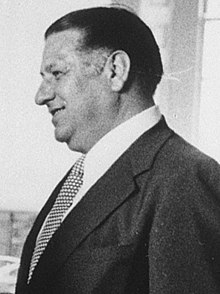
Back فرانك ريزو ARZ فرانک ریزو AZB Frank Rizzo German Frank Rizzo Spanish Frank Rizzo French Frank Rizzo SIMPLE Frank Rizzo Vietnamese
Frank Rizzo | |
|---|---|
 Rizzo in 1972 | |
| 93rd Mayor of Philadelphia | |
| In office January 3, 1972 – January 7, 1980 | |
| Preceded by | James Tate |
| Succeeded by | William J. Green III |
| Commissioner of the Philadelphia Police Department | |
| In office April 10, 1967 – February 2, 1971 | |
| Preceded by | Edward Bell |
| Succeeded by | Joseph O'Neil |
| Personal details | |
| Born | Francis Lazarro Rizzo October 23, 1920 Philadelphia, Pennsylvania, U.S. |
| Died | July 16, 1991 (aged 70) Philadelphia, Pennsylvania, U.S. |
| Resting place | Holy Sepulchre Cemetery, Cheltenham Township, Pennsylvania, U.S. |
| Political party | Democratic (1971–1986) Republican (1986–1991) |
| Spouse |
Carmella Silvestri (m. 1942) |
| Children | 2, including Frank Jr. |
| Military service | |
| Allegiance | United States |
| Branch/service | United States Navy |
| Years of service | 1938–1939 |
| Rank | |
Francis Lazarro Rizzo (October 23, 1920 – July 16, 1991) was an American police officer and politician. He served as commissioner of the Philadelphia Police Department (PPD) from 1967 to 1971 and mayor of Philadelphia from 1972 to 1980. He was a member of the Democratic Party throughout the entirety of his career in public office. He switched to the Republican Party in 1986 and campaigned as a Republican for the final five years of his life.
Rizzo was born to an Italian-American family in South Philadelphia, and joined the Philadelphia Police Department as an officer in 1943. He rose to public prominence as police commissioner, before seeking the mayor's office in 1971. He was re-elected in 1975.
A polarizing figure during his lifetime,[1] Rizzo's legacy has come under greater scrutiny in the years since his death due to the prevalence of racism and brutality within the Philadelphia Police Department. Before, during, and after Rizzo's tenure as police commissioner, the PPD engaged in patterns of police misconduct, in particular toward the black community.[2][3] The patterns of police brutality were documented in a Pulitzer Prize-winning Philadelphia Inquirer series by William K. Marimow and Jon Neuman.[4] As mayor, Rizzo, like many of his contemporaries, was opposed to the construction of public housing in established neighborhoods, most of which at the time housed majority-white populations.[5]
Rizzo was barred from running for a third consecutive term as mayor by Philadelphia's city charter. He attempted to vote in a charter change to allow him to attempt a run for reelection but was soundly defeated after urging supporters to "vote white", which he later admitted was "a poor choice of words".[6][7] He unsuccessfully ran for another term in 1983 and 1987. In 1991, he sought the mayoralty again, but died during the election campaign. Rizzo became the subject of multiple memorials throughout Philadelphia, including a statue in Center City. It was removed in 2020, amid the George Floyd protests against police brutality.
- ^ "You either loved him or hated him". The Philadelphia Inquirer. July 17, 1991. p. 1A. Retrieved April 25, 2024 – via Newspapers.com.
- ^ Williams, Suzanne Ife. Police brutality : case study of Philadelphia/Move. OCLC 84480572.
- ^ Blumgart, Jake (October 22, 2015). "The Brutal Legacy of Frank Rizzo, the Most Notorious Cop in Philadelphia History". Vice. Retrieved May 30, 2020.
- ^ "Sketches of Pulitzer Prize Winners in Journalism, the Arts and Letters". The New York Times. April 18, 1978. ISSN 0362-4331. Retrieved May 30, 2020.
- ^ "A historian on the Rizzo debate: 'It comes down to what statues do'". WHYY. Retrieved May 30, 2020.
- ^ Jaynes, Gregory (November 9, 1978). "Philadelphia's Message to Rizzo: 'Enough'". The New York Times. ISSN 0362-4331. Retrieved May 30, 2020.
- ^ Blumgart, Jake (September 18, 2018). "How Philly's Frank Rizzo Rode 'Blue-Collar Conservatism' to Victory". Bloomberg.com. Retrieved May 30, 2020.
© MMXXIII Rich X Search. We shall prevail. All rights reserved. Rich X Search